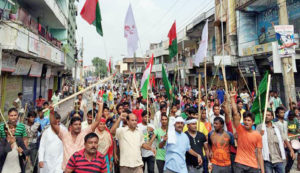
The Himalayan Times
By Hari Bansh Jha*
In Nepal, the political atmosphere is rife with tensions on the issue of holding local level elections next month. The Madheshis, Tharus and other Janajati (indigenous) groups who form bulk of the nation’s total population have vowed to disrupt the elections as it intends to give legitimacy to new Nepalese constitution promulgated on September 20, 2015, which has not yet addressed their concerns.
In their bid to boycott the local elections, different protest programmes are being launched in Madhesh, Tharuhat and Limbuan (hills) belts. Indefinite strike will also follow as the date of election, May 14, nears. In such a situation, any attempt to impose elections in Madhesh against the will of the people is sure to invite fresh conflict both during the day of the elections, if not before.
As it is well known, the constitution was made without having any participation of Madheshis in it. Besides, their demands for redrawing provincial boundaries, population-based elections, proportional representation in state mechanisms, and citizenship related issues remained unaddressed. The constitution was amended last year, but it was merely eyewash.
Subsequently, the present government, led by Pushpa Kamal Dahal, tabled the second amendment bill in the parliament to resolve the Madhesh issue. A provision was made in the new amendment bill to make second province for the Madheshis in Terai as part of the effort to redraw provincial boundaries. The amendment bill also made a provision for constituting a commission to resolve the issue of those controversial districts in Madhesh that have been clubbed with hill provinces and are yet to be integrated with Madhesh province.
But the new amendment bill was not acceptable to the agitating Madheshi groups because of the trust deficit. The Madheshis don’t believe that the commission would ever do any justice with them. In 2008, the government of Nepal duly signed agreement with the Madhesh-centric political parties to grant one Madhesh province from Mechi river in the east to Mahakali river in the west, but later on it backed off and the Madheshis thus felt cheated.
And more than that there was little in the amendment bill to meet the core demands of the Madheshis. Even in the local level elections, only 35 per cent of the village councils/municipalities were given in Madhesh, though this region accommodates over half of Nepal’s total population of 28 million. Realising the fact that the second amendment bill would not satisfy the agitating groups, the government later on replaced the amendment bill with a new one. But the new bill also overlooked the issue of redrawing of the provincial boundaries, which angered the Madheshi and hill Janajati groups more.
Acceptance of local level elections in the way the government wants will never allow the Madheshis, Tharus and other Janajati groups to have due representation in the elections of 59-member National Assembly and also in the election of the President of the country. In addition, there would be less of resources for the development of Madhesh region. Therefore, the Madhesh-centric political parties wanted the amendment of the constitution first before conducting the parliamentary, provincial and local level elections in the country.
In 2015-16, nearly 60 people were killed and thousands of people were injured in the Madheshi protests against the constitution. Recently, on March 6 this year, the police shot dead five more Madheshi activists in Rajbiraj, a small township in Terai, closer to the Indo-Nepal border, when they were protesting peacefully against the imposition of the local elections.
Unfortunately, the government is not taking the demands of the Madheshis, Tharus and other Janajati groups seriously. Minister for Law, Justice and Parliamentary Affairs Ajay Shankar Nayak termed the present protest programmes by the Madhesh-centric political parties against the upcoming local level elections as mere ‘drama.’
But the Deputy Prime Minister and Home Minister Bimlendra Nidhi made crucial revelations that the security arrangement and necessary preparations needed to be made for conducting local level polls was not sufficient. Nidhi, who represents Nepal’s largest political party, Nepali Congress, in the government, felt that political settlement of the Madheshi issue through dialogue was necessary for the successful completion of the elections.
Ever since preparation began for making constitution in June 2015, the major political parties have been making mistakes, one after the other, by excluding the Madheshis, Tharus and other Janajati groups in the constitution making process as well as in its amendment. Even this time, the government registered the constitution amendment bill in the parliament unilaterally without taking the Madhesh-centric political parties into confidence.
Therefore, fresh conflict in Madhesh and also in certain pockets of the hills seems to be inevitable as the government and some other political parties are in favour of holding the elections; while the Madhesh-centric parties and hill Janajati groups are in mood to disrupt it. Such a situation in the wake of the local level elections is not in the long term interest of the nation as it will further polarise the country that is already polarised on ethnic lines. It is better to make the constitution inclusive by amending it to the satisfaction of the agitating groups before holding elections for the parliamentary, provincial or local levels.
*The author is Professor of Economics and Executive Director of Centre for Economic and Technical Studies in Nepal
